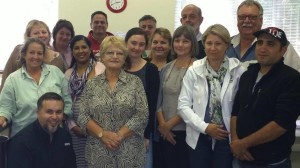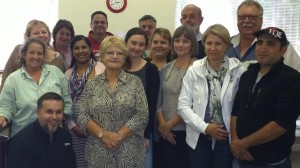Choosing the right cheese course is not a difficult as you might think, but it does take some planning:
Firstly it is important to consider your level of experience and to then have a look at the variety that is on offer in your area. Some courses will be plugged as beginner and others as advanced, but in most cases this is a matter of opinion on the side of the presenter. Some try to cram centuries of cheese making knowledge into one day.
A beginner course should cover the basics of using rennet, cheese cultures, and some practical on cheeses that are easy to make and that give a fast result, like cottage cheese, feta, mozzarella and halloumi. These cheeses are ready the same or the next day or at least at a stage where all the labour is done in the case of the feta, and we just have to wait a few days for the salt to penetrate.
Also aim for cheese types that need the minimum of equipment purchase – first see if cheesemaking is for you. So definitely go for cheese types that do not need pressure – thus no pressure-bearing molds or cheese press needed.
A starter course like this should be 2 days and no more – it is like your driver license theory – now the home practical must follow. When you have made the cheeses from the course on your own with success a few times, you are ready to move on.
It is important for the neophyte cheese maker to see fast results, nobody wants to make a parmesan as their first cheese and then have to wait in excess of six months to try it, just to have it taste terrible! Therefore doing the right cheese course is important to set you up for future success.
So I would start with the above and then later attend a course to follow that makes semi-hard cheese, that needs some maturation time – anything from 3 weeks to 2 months, like gouda or cheddar.
This can be followed by hard cheeses like parmesan or pecorino or even provolone, since you would have mastered mozzarella by this stage.
So no matter what specific cheeses you try, it is best to sequence them from soft to medium-hard to hard cheese.
The right cheese course presenter will not try to sell you a lot of expensive equipment on your first go, but will allow you to build your experience and cheese making consumables and equipment at your own pace. You will see that you should actually have most of the equipment in your kitchen already. You just need some cheese cloth, rennet and cultures and some calcium chloride for most cheeses – the rest like pots, thermometer, spoons and knives are most likely in your kitchen already.
Make sure that you write everything down during your first cheese making experience – so even though you have a recipe at hand, be sure to also make notes on the recipe, should something not be clear – you will be glad that you did when you are home and making cheese on your own. With cheese making it is important that you follow the recipe to the letter the first time and then on evaluating your cheese you can make one change at a time – document it well, and then see if the following outcome was as you expected. Don’t change too many variables at once – otherwise you will not know which ones worked and which not.
So even though you are initially interested only in making French, white mold cheeses, like camembert and brie, it is important to learn the basics of cheese making, so that you are able to experiment intelligently and make appropriate changes. So do a basic course first and then progress to your goal cheeses. This will give you more confidence, and more repeatable results in the long run – and cheese is a long run! It is classified as a slow food for a reason, but who can argue the goodness that comes with that?

http://www.gumtree.co.za/a-courses-training/melkbosstrand/cheese-making-course-+-stellenbosch/1001172403510910331454209
http://www.gumtree.co.za/a-courses-training/milnerton/cheese-making-course-+-stellenbosch/1001172401600910331454209
http://www.gumtree.co.za/a-courses-training/west-beach/cheese-making-course-+-stellenbosch/1001172399550910331454209
http://www.gumtree.co.za/a-courses-training/tableview/cheese-making-course-+-stellenbosch/1001172412000910331454209
http://www.gumtree.co.za/a-courses-training/worcester/cheese-making-course-+-stellenbosch/1001172406330910331454209
http://www.gumtree.co.za/a-courses-training/wellington/cheese-making-course-+-stellenbosch/1001172398640910331454209
http://www.gumtree.co.za/a-courses-training/franschhoek/cheese-making-course-+-stellenbosch/1001172399570910331454209
http://www.gumtree.co.za/a-courses-training/hermanus-caledon/cheese-making-course-+-stellenbosch/1001172415000910331454209
http://www.gumtree.co.za/a-courses-training/rooi+els/cheese-making-course-+-stellenbosch/1001172412040910331454209
http://www.cheesecourse.co.za


